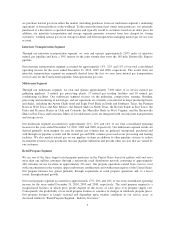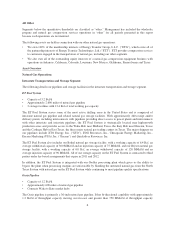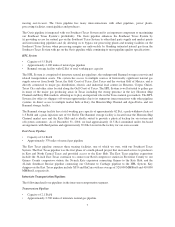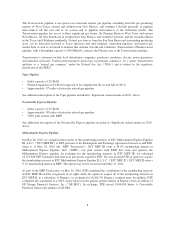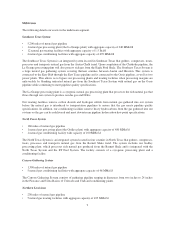Energy Transfer 2010 Annual Report Download - page 17
Download and view the complete annual report
Please find page 17 of the 2010 Energy Transfer annual report below. You can navigate through the pages in the report by either clicking on the pages listed below, or by using the keyword search tool below to find specific information within the annual report.recourse rate available to a prospective shipper as an alternative to the negotiated rate. Natural gas companies
must make offers of rate discounts and negotiated rates on a basis that is not unduly discriminatory. Existing
tariff rates may be challenged by complaint, and if found unjust and unreasonable, may be altered on a
prospective basis by the FERC. Rate increases proposed by the interstate natural gas company may be challenged
by protest or by the FERC itself, and if such proposed rate increases are found unjust and unreasonable may be
rejected by the FERC in whole or in part. Any successful complaint or protest against the FERC-approved rates
of our interstate pipelines could have a prospective impact on our revenues associated with providing interstate
transmission services. We cannot guarantee that the FERC will continue to pursue its approach of
pro-competitive policies as it considers matters such as pipeline rates and rules and policies that may affect rights
of access to natural gas transportation capacity, transportation and storage facilities.
Under the Energy Policy Act of 2005, the FERC possesses regulatory oversight over natural gas markets,
including the purchase, sale and transportation activities of non-interstate pipelines and other natural gas market
participants. Pursuant to the FERC’s rules promulgated under this statutory directive, it is unlawful for any
entity, directly or indirectly, in connection with the purchase or sale of electric energy or natural gas or the
purchase or sale of transmission or transportation services subject to FERC jurisdiction: (1) to defraud using any
device, scheme or artifice; (2) to make any untrue statement of material fact or omit a material fact; or (3) to
engage in any act, practice or course of business that operates or would operate as a fraud or deceit. The
Commodity Futures Trading Commission (“CFTC”) also holds authority to monitor certain segments of the
physical and futures energy commodities market pursuant to the Commodity Exchange Act (“CEA”). With
regard to our physical purchases and sales of natural gas, NGLs or other energy commodities; our gathering or
transportation of these energy commodities; and any related hedging activities that we undertake, we are required
to observe these anti-market manipulation laws and related regulations enforced by the FERC and/or the CFTC.
These agencies hold substantial enforcement authority, including the ability to assess civil penalties of up to $1
million per day per violation, to order disgorgement of profits and to recommend criminal penalties. Should we
violate the anti-market manipulation laws and regulations, we could also be subject to related third party damage
claims by, among others, sellers, royalty owners and taxing authorities.
Failure to comply with the NGA, the Energy Policy Act of 2005 and the other federal laws and regulations
governing our operations and business activities can result in the imposition of administrative, civil and criminal
remedies.
Intrastate Natural Gas Regulation.Intrastate transportation of natural gas is largely regulated by the state in
which such transportation takes place. To the extent that our intrastate natural gas transportation systems
transport natural gas in interstate commerce, the rates, terms and conditions of such services are subject to FERC
jurisdiction under Section 311 of the Natural Gas Policy Act (“NGPA”). The NGPA regulates, among other
things, the provision of transportation services by an intrastate natural gas pipeline on behalf of a local
distribution company or an interstate natural gas pipeline. The rates, terms and conditions of some transportation
and storage services provided on the Oasis pipeline, HPL System, East Texas pipeline and ET Fuel System are
subject to FERC regulation pursuant to Section 311 of the NGPA. Under Section 311, rates charged for intrastate
transportation must be fair and equitable, and amounts collected in excess of fair and equitable rates are subject
to refund with interest. The terms and conditions of service set forth in the intrastate facility’s statement of
operating conditions are also subject to the FERC review and approval. Should the FERC determine not to
authorize rates equal to or greater than our currently approved Section 311 rates, our business may be adversely
affected. Failure to observe the service limitations applicable to transportation and storage services under
Section 311, failure to comply with the rates approved by the FERC for Section 311 service, and failure to
comply with the terms and conditions of service established in the pipeline’s FERC-approved statement of
operating conditions could result in an alteration of jurisdictional status, and/or the imposition of administrative,
civil and criminal remedies.
The FERC has adopted market-monitoring and annual reporting regulations, which regulations are applicable to
many intrastate pipelines as well as other entities that are otherwise not subject to the FERC’s NGA jurisdiction
such as natural gas marketers. These regulations are intended to increase the transparency of wholesale energy
15


